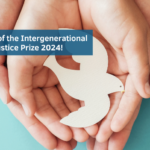The UN Summit of the Future was held from 22 – 23 September 2024 in New York. Now that it has passed, it is time to sit down and account for what we have achieved in the run-up to this monumental occasion and where there is still much room to improve.
In early 2023 we at the FRFG set out with a goal to get an official UN Day for Intergenerational Fairness recognised and approved. While we have celebrated some success in that regard – establishing a global network to push forth our agenda, celebrating the first provisional Intergenerational Fairness Day or creating our first English-speaking “Intergenerational Fairness Day Podcast” – the UN Summit of the Future opened up an important and unique opportunity to achieve our goal.
Monumentally, world leaders at the highly anticipated UN Summit of the Future adopted three foundational documents to protect our future for generations to come: “the Pact for the Future” and its two annexes “the Global Digital Compact” and “the Declaration on Future Generations”. As part of civil society, the FRFG gave written and oral input to both the Pact for the Future and the Declaration for Future Generations calling for a UN Day for Intergenerational Fairness/Future Generations. You can read our most recent input here. Unfortunately, our demand for a UN Day for Intergenerational Fairness/Future Generations was unmet. However, we must mention that we suggested that the UN should be committed to realising each of the four points mentioned in paragraph 32 (at the time of the draft: paragraph 36) of the declaration, rather than presenting them as optional by using the word “or”. This was indeed acknowledged and now the UN has committed to “(a) Take note of the Secretary-General’s proposal to appoint a Special Envoy for Future Generations to support the implementation of this Declaration; (b) Decide to convene an inclusive high-level plenary meeting of the General Assembly on future generations that will review the implementation of this Declaration during the eighty-third session of the General Assembly and provide updates on the actions taken to safeguard the needs and interests of future generations; (c) Request the Secretary-General to present a report on the implementation of this Declaration for consideration at the high-level plenary meeting to be held during the eighty-third session of the General Assembly”.
Elizabeth Cousens from the UN Foundation describes the pact as “a blueprint for a more streamlined and effective international system”. The pact spans 42 pages and outlines 56 broad actions to address the world’s biggest challenges, including breakthroughs in Security Council reform, the protection of civilians, addressing new threats such as lethal autonomous weapons systems and offers a boost to the Sustainable Development Goals and climate finance. It also represents the first agreed multilateral support for nuclear disarmament in more than a decade.
The Declaration on Future Generations, an unprecedented international agreement created expressly to protect the rights and prospects of future generations, was a key component of the Summit. It outlines a long-term strategy for global responsibility and governance and sets out a list of provisions and actions to improve the global capacity to think, plan and act for the future, as well as to protect the interests of both living and future generations. Derek Walker, the Commissioner for Future Generations in Wales, stated that “our future children and grandchildren need a global effort to safeguard their future, and vulnerable communities most harmed by today’s biggest problems can’t wait any longer for action. The adoption of the Declaration on Future Generations at the United Nations marks a significant moment for global governance, where nations are coming together to acknowledge the long-term impacts of today’s decisions”. Next to key provisions such as asserting the principle of “intergenerational justice” and institutionalising long-term thinking at the global level it signals a transformative shift in global governance which prioritises future well-being. Most notably it calls for the appointment of a Special Envoy for Future Generations at the UN.
While we have been unsuccessful in getting our claim recognised at the summit, the agreements adopted, particularly the Declaration on Future Generations, have been a tremendous step forward for the protection of future generations globally. It also allows us to remain hopeful in pushing for this UN day, especially in light of the Special Envoy for Future Generations and the recent EU plans for a new Commissioner for Intergenerational Fairness.
Also inspiring were the events organised around the summit during the so-called “Action Days.” The art exhibition “Good Ancestors: Art and Culture for Future Generations” supports the UN Declaration on Future Generations and was initiated by many contributors, including Michael Münker from Milliongenerations and the Permanent Missions of the Netherlands and Jamaica to the United Nations. It took place from 16 to 27 September in the Visitors Lobby of the UN General Assembly Building and invited visitors to explore art and cultural projects from around the world. Through universal themes such as community, rituals, and care, it emphasised the importance of intergenerational thinking and reminded us that future generations should be at the heart of our actions today.
There is a common consensus in the aftermath of the summit across all levels of actors: the summit itself will not change much and the real work begins now. It is up to not just the Member States but also academia, civil society, business and citizens to ensure the provisions set out in the three agreements are implemented properly and sustainably. There is momentum around future generations and we will continue to advocate not just for this UN Day but for everything that the idea of intergenerational fairness encompasses. We have to speak up for those who do not have a voice yet and who will be affected the most by our decisions in the future. “The road is rocky,” German Chancellor Olaf Scholz warned at the summit. “But was that ever any different?”.
At a time when peace and diplomacy seem to drift further and further into the distance and doubts about the UN’s effectiveness and ability for global governance seem to grow, the good news is that despite a terrible geopolitical environment that includes ongoing wars in Gaza and Ukraine, the vast majority of UN members still support multilateral collaboration.




